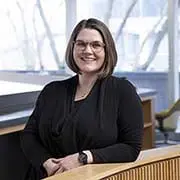 | 1 LU |
 | 1 LU |
As Early Childhood Education Centers grow and adapt to the ever-changing world around them, it is the programs with the deepest ties to the surrounding communities that prove the most resilient. Educational design can no longer solely focus on the students but must expand to meet the additional needs of the staff and the families within the community. This presentation will illustrate opportunities available to reach out to a community via early childhood education centers through case studies of completed centers in Massachusetts, Tennessee, and a project currently under construction in Colorado. These centers integrate early childhood education, educators, and community members through the interweaving of program and users. We will explore how thoughtfully designed spaces can improve staff experience and retention and offer learning opportunities in unexpected locations for children and adults alike. We will also review opportunities for programmatic overlap and the versatility of flex spaces designed for adaptability. Programs across the country are seeking an inclusive, engaging community hub that provides expanded opportunities for learning, growth and wellness for all members of the community and we want to help provide this through inspired and innovative design.
Learning Objectives:

Molly has dedicated her architectural career to the design of spaces devoted to small children and their caregivers. In her years with RDG Planning & Design, Molly has worked with a wide range of organizations and clients to create beautiful, functional spaces that support the growth and development of young children. Molly believes architecture is a powerful tool for societal change – she strives to positively impact the lives of children and their communities.

Edward is a professional architect with 24 years of experience. For the past two decades he has been devoted to developing early learning environments for RDG Planning & Design, leading the development of many facilities that serve over 6,500 children annually. The foundation of Edward’s practice and knowledge in early learning environments has been designing for schools in the Educare Learning Network, a research-based program that prepares young, at-risk children for school.
This track focuses on Resiliency and addresses how learning environments support the development of students and communities that have the strength and flexibility to withstand adversity and adapt to change. The COVID-19 pandemic demonstrated the essential role that schools have in stabilizing communities during a time of crisis. How do schools support the development of strong community culture among teachers and students? How do schools foster physical and mental health and wellness to ensure all are ready and supported to learn? How do we create learning environments that are strong in intent yet adaptable to change? How do we learn from what does not work and further, learn to take risks daily to expand our comfort zone? What can we learn from research and our responses to past events to inform how to build toward a resilient future where we can withstand what crises and challenges the future brings? Topic areas, seen through the lenses of both Art and Science, include sustainability, physical and mental health, community, school climate and culture, safety, and security.
Primary Core Competency
Design of Educational Facilities: Acts as a resource to the design team in providing ongoing guidance and support to ensure that the emerging and ultimate design aligns with the established community vision, education goals, future programming, written design standards, best/next practices and education policy.